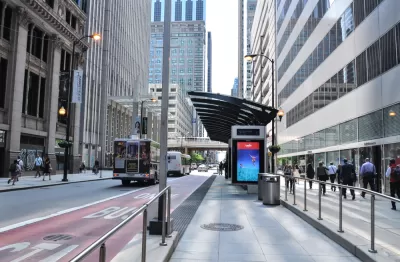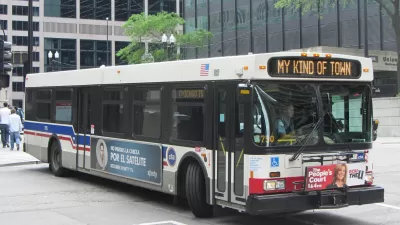In addition to funding the city's roadways and trains, Chicago could use new federal infrastructure dollars to shore up its bus system and invest in bus rapid transit that would improve service for riders.

In an opinion piece in the Chicago Tribune, Amy Rynell, executive director of the Active Transportation Alliance, argues that Chicago's efforts to revitalize its public transit system should focus on buses, particularly bus rapid transit (BRT). As Rynell writes, investing in BRT would bring other positive improvements to the city. "Investments in BRT often come with major upgrades for people walking and biking with wider sidewalks, protected bike lanes and stations that comply with the Americans with Disabilities Act. They spur neighborhood economic development, leading to more affordable housing and small businesses with access to rapid transit."
Rynell calls on city leaders to allocate more resources to bus service, asking "Why aren’t our transportation and transit agencies working together to pursue innovative, equity-focused investments in bus service?" Rynell then describes the city's failed Ashland Avenue BRT project, which she suspects is influencing the city's reluctance to invest in more buses. But Rynell argues in favor of reviving that plan, which was stopped due to opposition from local businesses. According to the article, the Ashland Avenue BRT plan was the most cost-effective proposal evaluated by the regional planning agency, and federal dollars could pay for a substantial portion of the cost of new BRT lines. In the meantime, Rynell also recommends upgrading service with dedicated bus lanes on the city's most-used routes.
FULL STORY: Op-ed: Revitalizing Chicago’s bus rapid transit system should start with Ashland Avenue

Alabama: Trump Terminates Settlements for Black Communities Harmed By Raw Sewage
Trump deemed the landmark civil rights agreement “illegal DEI and environmental justice policy.”

Study: Maui’s Plan to Convert Vacation Rentals to Long-Term Housing Could Cause Nearly $1 Billion Economic Loss
The plan would reduce visitor accommodation by 25% resulting in 1,900 jobs lost.

Planetizen Federal Action Tracker
A weekly monitor of how Trump’s orders and actions are impacting planners and planning in America.

Waymo Gets Permission to Map SF’s Market Street
If allowed to operate on the traffic-restricted street, Waymo’s autonomous taxis would have a leg up over ride-hailing competitors — and counter the city’s efforts to grow bike and pedestrian on the thoroughfare.

Parklet Symposium Highlights the Success of Shared Spaces
Parklets got a boost during the Covid-19 pandemic, when the concept was translated to outdoor dining programs that offered restaurants a lifeline during the shutdown.

Federal Homelessness Agency Places Entire Staff on Leave
The U.S. Interagency Council on Homelessness is the only federal agency dedicated to preventing and ending homelessness.
Urban Design for Planners 1: Software Tools
This six-course series explores essential urban design concepts using open source software and equips planners with the tools they need to participate fully in the urban design process.
Planning for Universal Design
Learn the tools for implementing Universal Design in planning regulations.
Caltrans
Smith Gee Studio
Institute for Housing and Urban Development Studies (IHS)
City of Grandview
Harvard GSD Executive Education
Toledo-Lucas County Plan Commissions
Salt Lake City
NYU Wagner Graduate School of Public Service



























